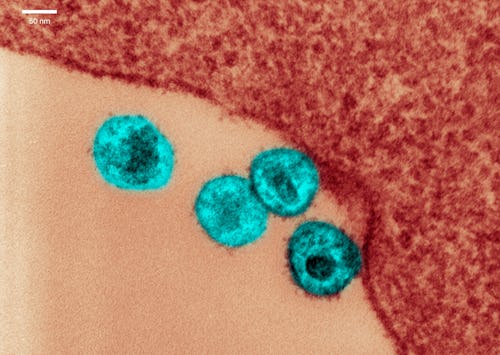
Amidst the COVID pandemic, it’s easy to forget that there are other viruses that put people’s lives at risk. But the reality is that, while the loss of life we’re currently facing is terrifying and sad, the decades-long H.I.V. epidemic has taken more lives still and it disproportionately impacts queer folks and POC. Over 36 million people have died from H.I.V., and there is no cure to date, although a vaccine is in the works. But in a groundbreaking new case, researchers appear to have cured yet another woman of H.I.V..
This new research was presented yesterday at the Conference on Retroviruses and Opportunistic Infections in Denver. The mixed-race, middle-aged woman — who has not been named in order to protect her privacy — also had leukemia, according to the New York Times.
As part of her treatment for cancer and H.I.V., she received umbilical cord blood from a donor. The cord blood treatment was used instead of a bone marrow transplant because blood marrow transplants require a very close match and cord blood treatments require only a partial match, NYT reported. This detail is crucial because most bone marrow donors are caucasian, which means that most of the people who benefit from bone marrow transplants are also caucasian. That leaves a giant swath of the population unable to receive life saving marrow treatments. To be clear, the reason why most marrow donors are white is complex and tainted with the stench of medical racism, but BIPOC also have more difficulty finding close matches with donations because their genetic makeup tends to be more diverse than people of european descent.
All of this is to say that this cord blood treatment could create inroads to H.I.V. treatment and cure for more diverse people. “The fact that she’s mixed race, and that she’s a woman, that is really important scientifically and really important in terms of the community impact,” Steven Deeks, an AIDS expert at the University of California, told the New York Times. There are only two other confirmed cases of people being cured of H.I.V., and both of them were men who received bone marrow transplants.
Unfortunately, this exact situation will never become the norm because the cord blood procedure researchers used will likely benefit no more than 50 people per year. But as Deeks pointed out: “These are stories of providing inspiration to the field and perhaps the road map,” NYT reported. Indeed.
The woman who received the umbilical cord blood has been in remission from leukemia for four years, NBC reported. She stopped receiving H.I.V. treatment three years after the procedure and has now had no signs of the virus or its antibodies for 14 months. Still, some doctors prefer to call this a case of H.I.V. remission rather than H.I.V. cure, because some H.I.V. patients in the past have experienced a rebound more than two years into remission. Still, whether you call it remission or cure, this seems like a definite win for medical science.







